
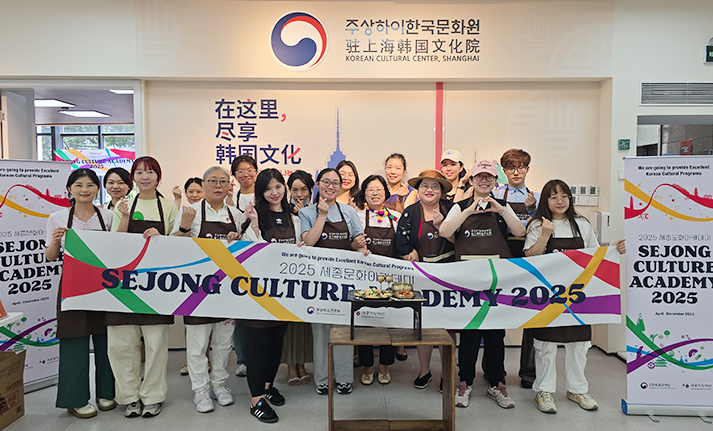
“It was a unique experience to prepare Korean
dishes that are not easily accessible in everyday life!” Meeting with Two Learners
from KSI Korean Cultural Center, Shanghai,
Who Participated in the 2025 Sejong
Culture Academy Korean Cuisine Course
Gao Jing and Kim Ye-bi, learners from KSI Korean Cultural Center, Shanghai, took part in the 2025 Sejong Culture Academy Korean Cuisine Course last July, where they had the special opportunity to make royal cuisine and desserts of Korea themselves. We met with the two learners, who deepened their understanding of Korean culture through Korean cuisine, to hear about their experiences.
Hello, Gao Jing and Kim Ye-bi! Could you first introduce yourselves to the readers of Monthly Knock Knock?
Gao Jing : Hello, I am Gao Jing. From August 2024 to June 2025, I studied in the Korean language course at KSI Korean Cultural Center, Shanghai. Recently, I also participated in the Sejong Culture Academy Korean Cuisine Course held at KSI Korean Cultural Center, Shanghai. Currently, I am working in finance!
Kim Ye-bi : Hello, I am Kim Ye-bi. I am very pleased to participate in this Monthly Knock Knock interview. I am currently a volunteer for the Jade Buddha Temple Foundation in Shanghai. The Jade Buddha Temple receives many foreign visitors, but as there are no separate guides in foreign languages, I began volunteering on weekends to provide free tours for international tourists. Introducing the Jade Buddha Temple in English to foreigners has been very enjoyable, but I also wanted to learn more languages to communicate with people from various countries. In April, I came across the KSI Korean language course through the official account of KSI Korean Cultural Center, Shanghai and began studying Korean in the Spring Semester 1A class. I had no prior knowledge of Korean at all, but the KSI teacher explained difficult parts very kindly, which allowed me to successfully complete the course. Now I am able to engage in basic Korean conversations. I also made many friends at KSI, and I am currently continuing my Korean studies happily in the 1B class.
The Sejong Culture Academy Korean Cuisine Course at KSI Korean Cultural Center, Shanghai, Conducted by Korean Cuisine Cultural Expert Kim Hyun-sook
You participated in the 2025 Sejong Culture Academy Korean Cuisine Course held in July. Could you tell us what expectations you had and what interest in Korean cuisine led you to join this course?
Gao Jing : I have visited Korea several times and I enjoy Korean food very much. However, the variety of Korean food available in China is somewhat limited. Usually, in Korean restaurants in China, you can only find well-known dishes such as bulgogi, bibimbap, and naengmyeon. Then I learned that KSI Korean Cultural Center, Shanghai was offering a Korean cuisine course on royal cuisine and desserts. I had never tried traditional Korean royal cuisine before, and since the course allowed us to prepare it ourselves, I was very interested and decided to join. It was a truly valuable opportunity to participate in a course in Shanghai that you would not easily encounter even in Korea.
Kim Ye-bi : I have a close friend who loves Korean culture and Korean food, and she often takes me to Korean restaurants. The Korean street in Minhang District, Shanghai, is very famous, and it offers a wide variety of Korean dishes such as budae-jjigae, naengmyeon, eomuk, and ramyeon. As I often went there with my friend, I naturally developed an interest in Korean cuisine and came to like many of the foods. However, the royal cuisine and desserts introduced in this course were dishes I had never seen or even heard of before. Moreover, I personally enjoy studying cooking and, of course, eating as well. Just knowing that I could learn about Korean royal cuisine and desserts filled me with great anticipation. That is why I applied right away without hesitation.
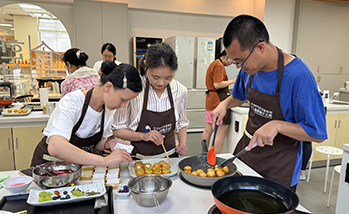 Learners Making Gaeseong Juaak
Learners Making Gaeseong Juaak 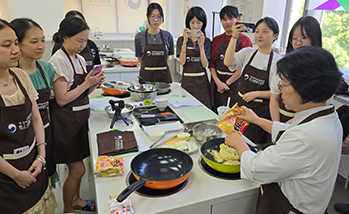 Cultural Expert Kim Hyun-sook Demonstrating
Cultural Expert Kim Hyun-sook Demonstrating
Nongshim Shin Ramyeon Toowoomba
This course was held under the theme of “Korean Royal Cuisine and Desserts” and featured a variety of hands-on cooking activities. Could you share the most memorable experience or the moment you enjoyed the most?
Gao Jing : The most enjoyable time for me was making Gaeseong Juaak. Above all, I was impressed by how the instructor was both very approachable and highly knowledgeable and skilled. Even though the class went far beyond the scheduled two hours, the atmosphere remained delightful until the end. I wasn’t very skilled at kneading dough, so my rice cakes didn’t look very neat, and when I put them in the oil, they stuck together and made us laugh. But once they were fried properly, they looked much better, and everyone was pleased. What I especially remember was how the teacher, after finishing her demonstration, went around to each team and carefully corrected the state of the dough one by one. Also, being able to take home beautifully packaged Gaeseong Juaak afterward and share them with my family was the greatest reward of this class!
Kim Ye-bi : In this Korean cuisine course, we worked in groups of four to make “Spicy Prawns with Pine Nut Sauce” (Daeha Jatjeup Muchim) and “Chogyotang” (vinegar mustard soup). We also had the unique opportunity to taste the dishes prepared by the instructor, including Nongshim Shin Ramyeon Toowoomba, kimchi salad, Gaeseong Juaak, and dried Jeju tangerines. Among the dishes we made ourselves, my favorite was the “Spicy Prawns with Pine Nut Sauce.” We thinly sliced cucumbers and salted them, steamed shrimp with cooking wine, pepper, ginger, and green onions, then peeled and halved them. We added finely chopped fresh bamboo shoots, stir-fried them with beef strips and the salted cucumbers, and finally mixed everything together, sprinkling pine nut powder on top to finish. Tasting it together with the kimchi prepared by the instructor was so refreshing and really whetted my appetite. The instructor also prepared Nongshim Shin Ramyeon Toowoomba in the style of Italian pasta, which was truly surprising. She sautéed onions, added milk and brought it to a boil, then put in the ramyeon seasoning and noodles, topped it with cheese, and melted it slowly—it was absolutely delicious. After the class, I even made it at home for my family, and everyone complimented me, saying it was delicious.
Learners of the Sejong Culture Academy Korean Cuisine Course with Cultural Expert Kim Hyun-sook
Through the Sejong Culture Academy Korean Cuisine Course, what new insights or lessons did you gain about Korean royal cuisine and desserts? Did this course also deepen your understanding of Korean culture?
Gao Jing : Before taking this course, I had once searched online for “Gaeseong Juaak,” but it was difficult to find related information in China. Through the class, however, I learned that Gaeseong Juaak is quite popular among young people in Korea and that it is also sold at a high price. I was impressed to discover that this dessert has been revitalized by the “retro trend,” combining traditional elements and simple ingredients with modern additions such as yogurt and fruit. For me, who had never experienced royal cuisine before and could not easily purchase it, this course was a truly special experience. It also allowed me to gain a deeper understanding of Korean food culture.
Kim Ye-bi : What I learned from this course is that royal cuisine was not food enjoyed only within the palace. It was also bestowed by the king upon soldiers or generals, who then brought it home to share with their families, passing the dishes down through generations. I was also deeply impressed by the fact that royal cuisine uses very little seasoning, which aligns well with the healthy dietary practices that many people around the world now pursue.
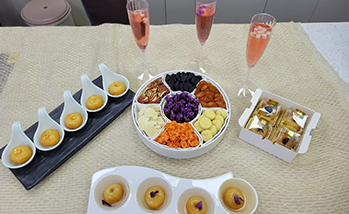
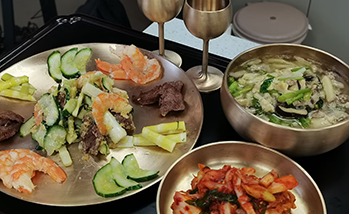
Gaeseong Juaak, Omija Hwache (Five-flavor berry punch), Spicy Prawns with Pine Nut Sauce,
and Chogyotang (vinegar mustard soup) Prepared by Learners of KSI Korean Cultural Center, Shanghai
Would you like to continue participating in different Korean cultural courses through the Sejong Culture Academy in the future? What other aspects of Korean culture would you like to explore?
Gao Jing : Absolutely! If I have the opportunity, I would love to continue participating in the diverse cultural courses offered by the Sejong Culture Academy. I am also very interested in traditional Korean textiles and clothing. In particular, I would like to join courses or activities related to patchwork (jogakbo) and embroidery.
Kim Ye-bi : I, too, would like to continue joining other Korean cultural courses through the Sejong Culture Academy. Through this Korean cuisine course, I not only gained knowledge about Korean food culture but also enjoyed the experience of preparing food myself. Moreover, I became closer with my teammates as we cooked and shared food together, so I would love to spend more meaningful time making new friends through such classes. I am especially curious about Korean fried chicken and soju, as I have not yet had the chance to try them. I hope there will be a course on these in the future. I have also recently developed an interest in Korean dramas, so I would like to participate in related courses as well!